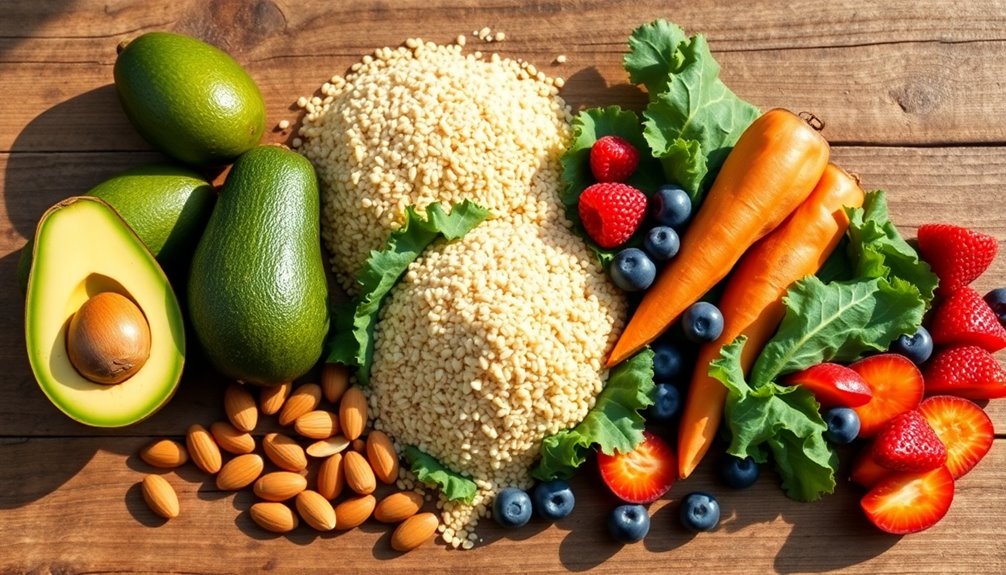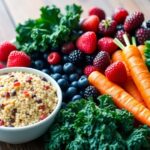To create a well-rounded diet, focus on nutrient-dense foods. Leafy greens like kale and spinach pack vitamins A, C, and K, while berries provide antioxidants and fiber. Whole grains, such as quinoa and brown rice, are excellent sources of B vitamins and magnesium. Lean proteins from sources like chicken, fish, and lentils support muscle health. Don't forget nuts and seeds like almonds and chia seeds, which are rich in healthy fats and fiber. Incorporating avocados and fatty fish also boosts omega-3 intake, promoting heart health. Keep going to explore more fantastic options for enhancing your diet!
Key Takeaways
- Leafy greens like kale and spinach provide essential vitamins A, C, and K, boosting overall health and immunity.
- Berries are rich in antioxidants and fiber, promoting anti-inflammatory benefits and digestive health.
- Whole grains such as quinoa and brown rice offer B vitamins and magnesium for energy and metabolic support.
- Lean proteins from chicken, fish, and lentils are vital for muscle development and immune function.
- Healthy fats from sources like avocados and fatty fish enhance heart health and provide essential fatty acids.
Leafy Greens
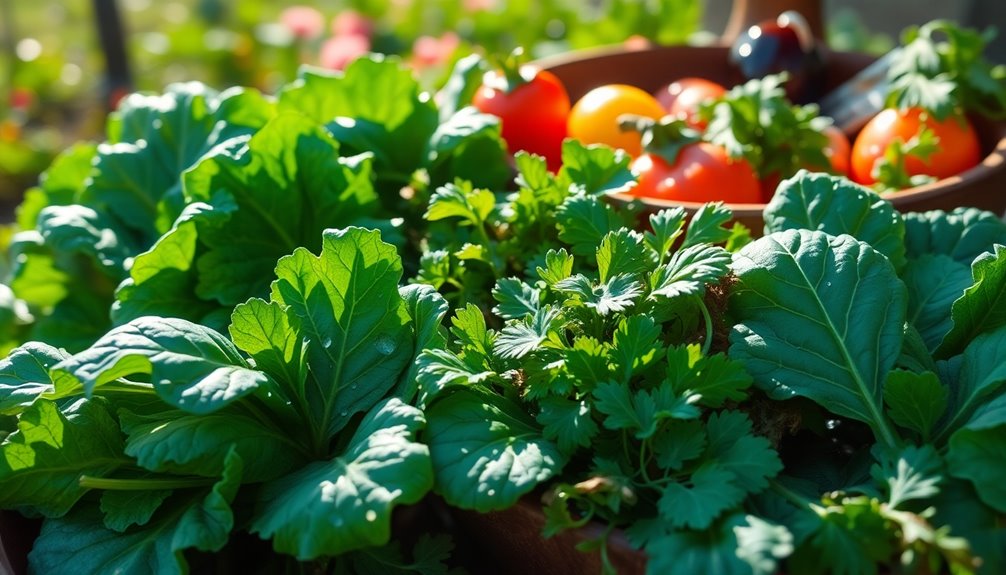
Leafy greens are a powerhouse of nutrients, essential for anyone looking to enhance their diet. Packed with vitamins A, C, and K, as well as minerals like iron and calcium, they're crucial for maintaining overall health. You mightn't realize how easy it's to incorporate them into your meals.
Consider experimenting with different salad recipes that showcase their crisp textures and vibrant colors. Try mixing kale, spinach, and arugula to create a nutrient-rich base. Toss in some nuts, seeds, or avocado for healthy fats, and you've got a delicious, filling meal.
If salads aren't your thing, you've got plenty of smoothie options to explore. Leafy greens blend seamlessly with fruits like bananas and berries, adding essential nutrients without overwhelming the flavor. Spinach and kale are particularly great choices, as they're mild-tasting yet nutrient-dense. Just a handful can elevate your morning smoothie, providing a boost of energy and essentiality. Incorporating plant-based protein into your smoothies can enhance their nutritional profile even further, making them a great option for weight loss and energy boost.
Incorporating leafy greens into your diet doesn't have to be challenging. Whether you're crafting a quick salad or whipping up an invigorating smoothie, these greens can easily fit into your routine. Not only do they support your health goals, but they also create a sense of community.
Sharing salad recipes or smoothie ideas with friends or family can foster connection and inspire everyone to embrace healthier eating habits together. So go ahead, get creative with your leafy greens, and enjoy the nourishing benefits they bring to your life!
Berries
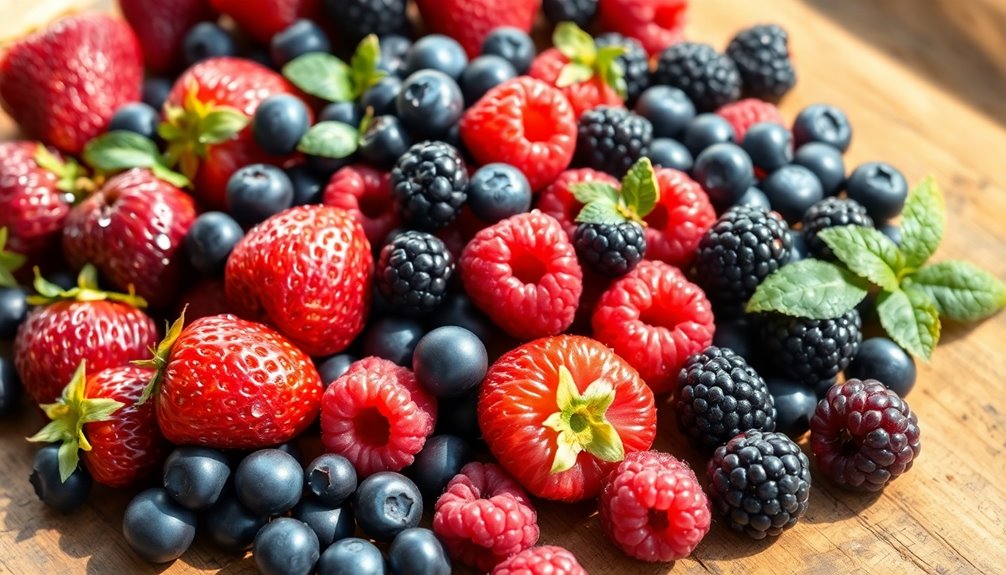
Berries are another fantastic addition to a well-rounded diet, offering an impressive array of nutrients and health benefits. These tiny fruits pack a powerful punch, providing you with both antioxidant power and fiber benefits. Eating a variety of berries can help you enhance your overall health while satisfying your taste buds. Additionally, incorporating plant-based foods into your diet can amplify the health benefits you receive from berries.
Here's a quick overview of some popular berries and their key benefits:
| Berry | Antioxidant Power | Fiber Benefits |
|---|---|---|
| Blueberries | High | 4 grams per cup |
| Strawberries | Very High | 3 grams per cup |
| Raspberries | High | 8 grams per cup |
| Blackberries | Very High | 7 grams per cup |
Berries are rich in vitamins C and K, and they're known for their anti-inflammatory properties. The antioxidants found in these fruits, like anthocyanins, help combat oxidative stress and may reduce the risk of chronic diseases. Plus, their fiber benefits contribute to digestive health, helping you feel fuller longer and supporting a healthy gut.
Incorporating berries into your meals can be simple and enjoyable. Toss them into your morning oatmeal, blend them into a smoothie, or enjoy them as a snack. With their vibrant colors and delicious flavors, berries not only nourish your body but also elevate your meals. So, go ahead and embrace these nutrient-dense gems for a healthier you!
Whole Grains
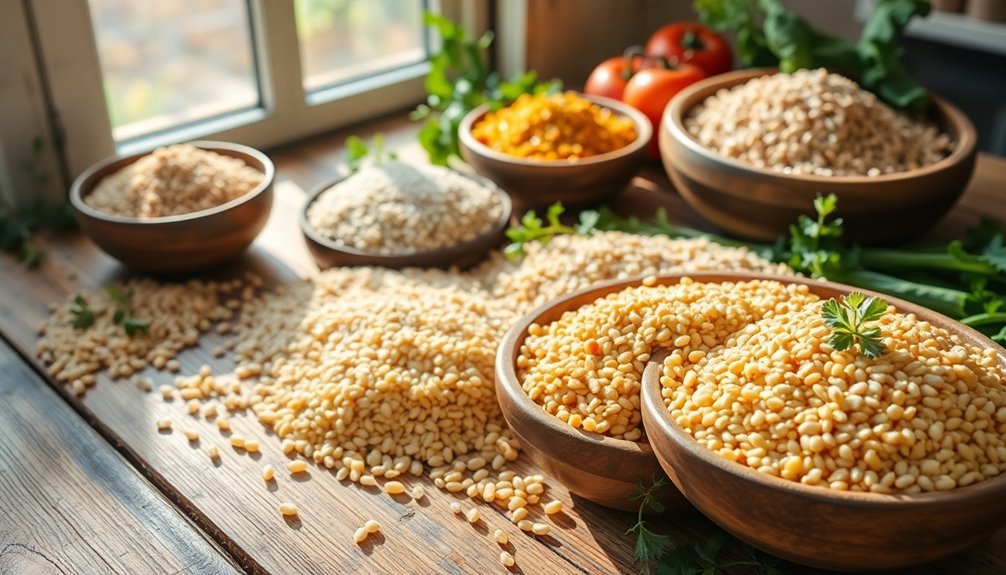
When it comes to building a well-rounded diet, whole grains should definitely be on your radar. These nutrient-dense foods, like brown rice, quinoa, and whole wheat bread, offer a wealth of benefits that can help you feel your best. One of the standout features of whole grains is their high fiber content. Fiber benefits include improved digestion, reduced risk of heart disease, and enhanced feelings of fullness, making it easier to maintain a healthy weight. Incorporating whole grains into your meals can be a simple yet effective way to boost your overall nutrition.
It's also important to address gluten misconceptions that often surround whole grains. Many people believe that gluten, a protein found in wheat and other grains, is unhealthy for everyone. In reality, gluten is only a concern for individuals with celiac disease or gluten intolerance. For most people, whole grains provide essential nutrients like B vitamins, iron, and magnesium, along with that beneficial fiber. Embracing whole grains can actually be a delicious way to diversify your meals and enhance your health. Furthermore, it's crucial to recognize that traditional bread can have significant negative effects on health, leading to weight gain and blood sugar spikes.
Lean Proteins
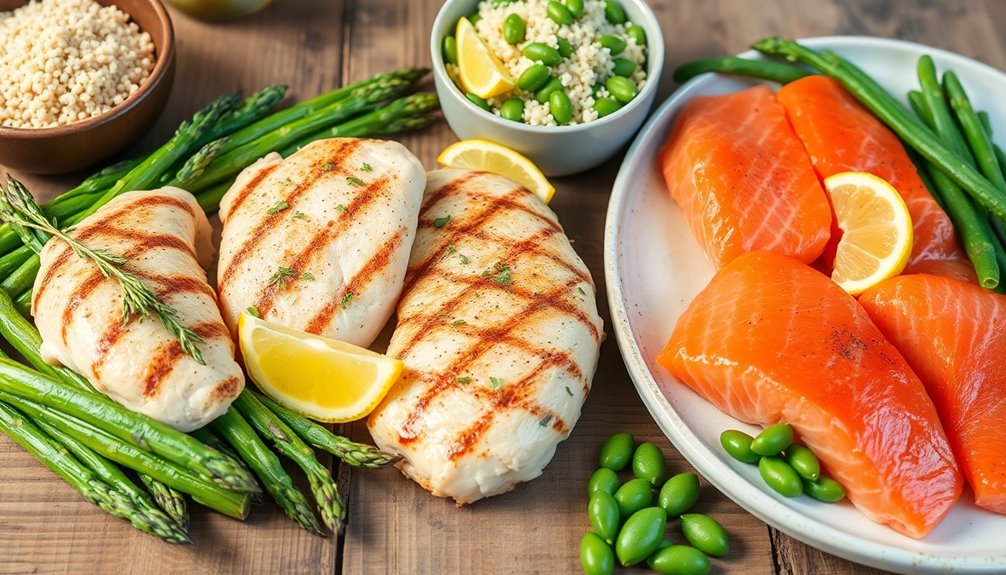
Whole grains lay a solid foundation for a balanced diet, but they're just one part of the equation. To truly nourish your body, you need to incorporate lean proteins, which are essential for muscle building and overall health. Lean proteins provide your body with the amino acids it needs to repair tissues, support immune function, and maintain muscle mass.
When you think of lean proteins, many people immediately consider chicken, turkey, and fish. However, don't overlook plant-based sources like lentils, chickpeas, and quinoa. These options not only offer protein but also come packed with fiber, vitamins, and minerals, making them fantastic choices for those looking to boost their nutrient intake.
Incorporating lean proteins into your meals can be easy and satisfying. Try adding grilled chicken or tofu to salads, or mix beans into your soups and stews. These additions can enhance flavor and texture while ensuring you're getting the protein your body craves.
Moreover, lean proteins can support your fitness goals. If you're engaging in regular exercise, consuming adequate protein is essential for muscle recovery and growth. Research indicates that a diet rich in protein can help you feel fuller longer, assisting in weight management. Additionally, consuming lean proteins can promote rapid fat loss, contributing to overall health and wellness.
Nuts and Seeds
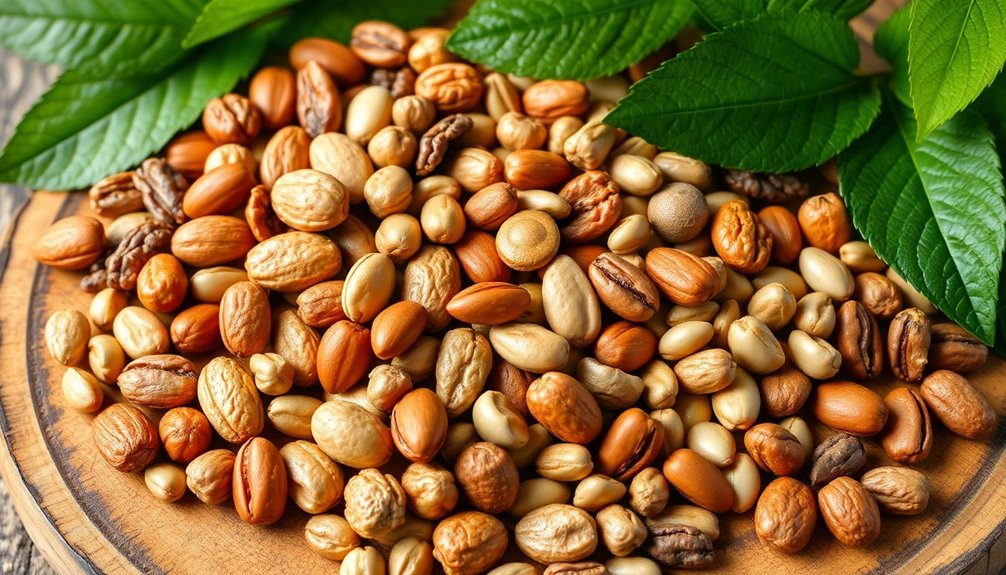
Nuts and seeds are powerhouse additions to your diet, offering a wealth of nutrients that can greatly enhance your overall health. They're packed with protein, fiber, healthy fats, vitamins, and minerals, making them an ideal snack or meal addition. Including a variety of nuts and seeds in your daily routine can support heart health, improve brain function, and aid in weight management.
When it comes to preparation, you might want to explore different roasting techniques. Roasting nuts and seeds can intensify their flavor and make them even more enjoyable to eat. You can try dry roasting, which retains their natural oils, or add a touch of seasoning for extra taste. Just be cautious about the temperature and time, as over-roasting can diminish their health benefits.
The health benefits of nuts and seeds are impressive. For instance, almonds and walnuts are rich in omega-3 fatty acids, which promote cardiovascular health. Chia seeds and flaxseeds provide an excellent source of fiber and protein, helping you feel full longer. Consuming a handful of mixed nuts or a sprinkle of seeds can also stabilize blood sugar levels, making them a smart choice for energy throughout the day. Incorporating research-based approaches to your diet can further enhance the effectiveness of these nutrient-dense foods.
Healthy Fats
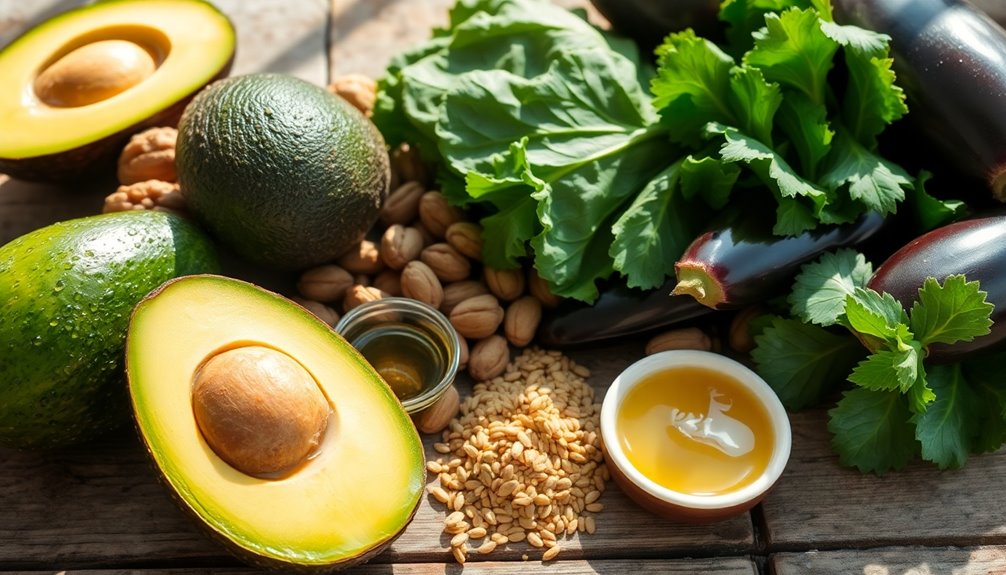
Healthy fats play an essential role in maintaining peak health and should be a fundamental part of your diet. They're crucial for nutrient absorption, hormone production, and brain health. Including healthy fats can enhance your overall well-being and help you feel satisfied after meals.
One of the best sources of healthy fats is avocados. These creamy fruits are packed with monounsaturated fats, which can lower bad cholesterol levels and support heart health. The avocado benefits don't stop there; they're also rich in fiber, vitamins, and minerals, making them a superb addition to salads and smoothies.
Coconut oil is another fantastic option that deserves a place in your kitchen. With a high smoke point, it's perfect for cooking at high temperatures. Plus, coconut oil uses extend beyond cooking; you can also use it for skin moisturization and hair care. Its medium-chain triglycerides (MCTs) can provide a quick source of energy and may even support weight management.
When it comes to omega-3 sources, fatty fish like salmon and sardines are excellent choices, but don't forget about plant-based options. Flaxseeds, chia seeds, and walnuts are all rich in ALA, a type of omega-3 fatty acid that can help reduce inflammation and support heart health. Additionally, incorporating increased oxygen intake into your lifestyle can further enhance your metabolic rate and aid in weight management.
Incorporating these healthy fats into your meals can make a significant difference in how you feel and function every day. Embrace these nutrient-dense foods, and you'll be well on your way to a balanced, satisfying diet.
Frequently Asked Questions
How Can I Incorporate More Nutrient-Dense Foods Into My Meals?
To incorporate more nutrient-dense foods into your meals, start with meal planning. Choose a day to map out your week, focusing on including a variety of colorful fruits and vegetables.
When you find recipes you love, consider recipe modification—swap out less nutritious ingredients for healthier options. For instance, use whole grains instead of refined ones or add leafy greens to your favorite dishes.
These small changes can make a big difference in your overall nutrition!
Are There Any Nutrient-Dense Foods to Avoid for Certain Diets?
When considering nutrient-dense foods to avoid, think about your specific dietary restrictions.
For example, if you're avoiding gluten, steer clear of foods like whole wheat bread, even though it's nutrient-dense. Instead, try nutrient-dense alternatives like quinoa or brown rice.
If you're vegan, limit high-fat dairy sources like cheese.
Always prioritize foods that align with your needs while still providing those essential nutrients to foster a balanced diet.
What Are the Health Benefits of Eating a Variety of Nutrient-Dense Foods?
Eating a variety of nutrient-dense foods is like painting with a full palette—each color adds depth to your masterpiece. When you mix different nutrients, you enhance nutrient absorption, helping your body utilize vitamins and minerals more effectively.
This variety boosts your energy levels, keeping you vibrant and active throughout the day. Plus, it fosters a sense of belonging as you explore diverse flavors and cuisines, connecting with others over shared meals.
How Do Cooking Methods Affect the Nutrient Content of These Foods?
Cooking methods heavily influence the nutrient content of foods. When you steam vegetables, you preserve more vitamins compared to frying them, which can add unhealthy fats and diminish nutrients.
Similarly, some nutrients are more bioavailable in cooked foods, while others are best consumed raw. For instance, cooking tomatoes increases lycopene levels, but raw broccoli offers more vitamin C.
Choosing the right method can enhance your meals and help you maximize their health benefits.
Can Nutrient-Dense Foods Help With Weight Management or Loss?
Think of nutrient-dense foods as a cozy blanket on a chilly day; they provide comfort and satisfaction. Incorporating these foods into your snacks can help with weight management or loss by enhancing satiety.
When you choose snacks rich in nutrient density, you're not just filling your stomach—you're nourishing your body, which can curb cravings and make it easier to stick to healthier eating habits. Ultimately, this approach supports sustainable weight goals.
Conclusion
Incorporating these nutrient-rich foods into your diet is like planting a garden that flourishes with health benefits. Just as diverse plants create a vibrant ecosystem, a variety of leafy greens, berries, whole grains, lean proteins, nuts, and healthy fats can transform your well-being. Research shows that a balanced diet can reduce the risk of chronic diseases, making your body thrive. So, start your health journey today, and watch how your life blossoms with energy and vitality!

